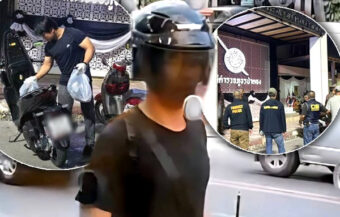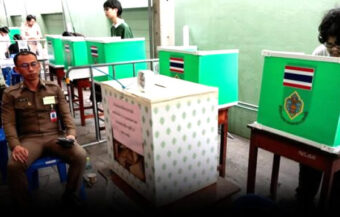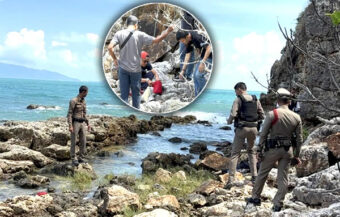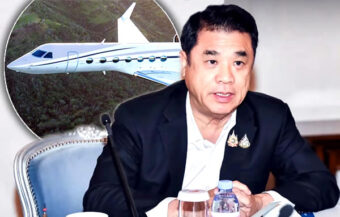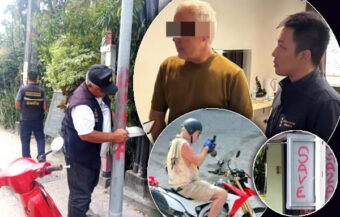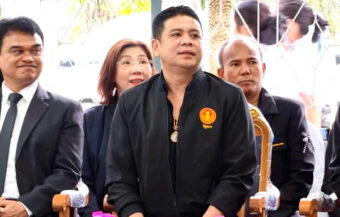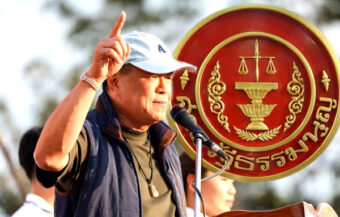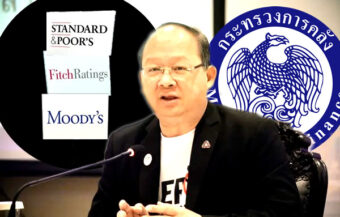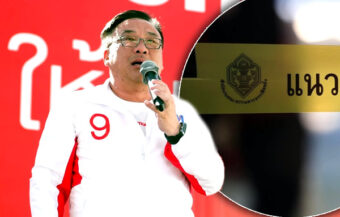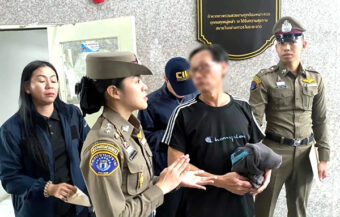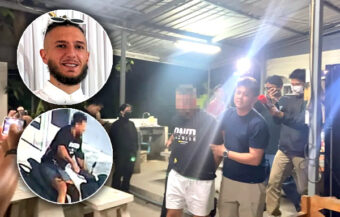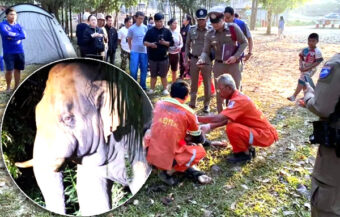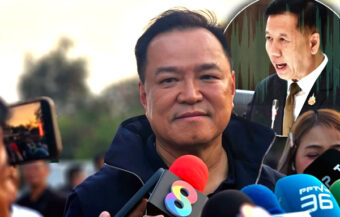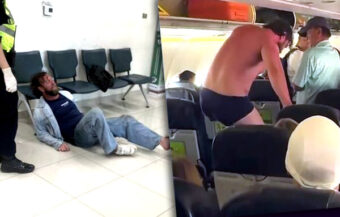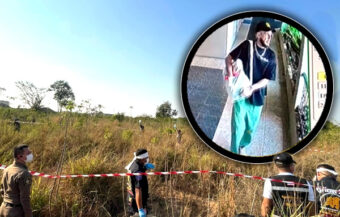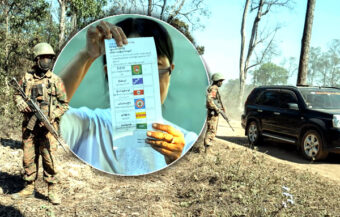Thai border tensions soar after Cambodian spy caught for just ฿162/day. Martial law orders to tighten security, nationwide drone ban enforced. Arrests and rocket attacks raise fears of coordinated destabilisation. Authorities vow to defend sovereignty and keep peace in volatile eastern provinces.
The Thai government has slammed a stark warning to Cambodians tempted by Phnom Penh’s offers to spy inside Thailand. It could lead to the death penalty. The focus? The country’s volatile eastern provinces. Despite a shaky ceasefire and ongoing diplomacy, fears are mounting of a coordinated plot to destabilise the border region. Last Friday, community-based security forces in Sa Kaeo Province nabbed a Cambodian national caught red-handed spying. In a scene more embarrassing than Bond-worthy, the so-called Cambodian James Bond admitted to security officials he was paid a measly ฿162 a day for his mission. He snuck into Thailand illegally to gather intel on local communities and military sites. This arrest follows a July 30 swoop on three Chinese nationals caught flying drones near a military base. Initially suspected of spying, the trio was later cleared as journalists—after showing proper documents.
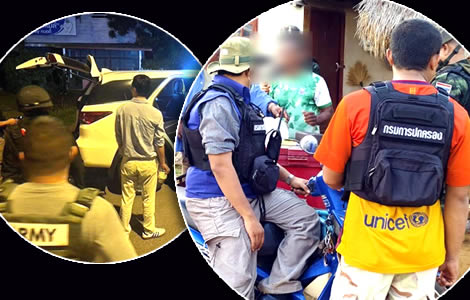
Meanwhile, Thailand has slapped a nationwide ban on all drone flights. The military and security forces have doubled down, boosting surveillance and working with border communities under martial law. The goal: tighten security and calm nerves amid heightened tensions.
Tensions remain high in Thailand’s eastern border provinces following the arrest of a Cambodian national suspected of espionage. The man was detained on August 1 in Ta Phraya District, Sa Kaeo Province, by Village Security Guards (VSD). He was found near a restricted area close to the Cambodian border, where he reportedly acted in a suspicious manner.
Tensions rise after Cambodian spy arrested near border as military increases control under Martial Law
During interrogation, the suspect admitted to working for Cambodian intelligence. According to Thai authorities, he infiltrated the kingdom to collect and send back military information to Phnom Penh. In exchange, he received just 20,000 riel per day—approximately ฿162. Consequently, this admission has triggered alarm, especially given recent developments along the border.
Notably, the arrest came just days after a deadly Cambodian attack on July 24, during which BM-21 Grad rockets rained down on Thai territory. As a result, 15 Thai civilians were killed, while many more were injured or displaced. Since then, fears of further incursions have gripped local communities, especially in eastern provinces like Sisaket, Sa Kaeo and Surin.
In response to the arrest, the Thai government has taken a hardline stance. On August 3, government spokesman Jirayu Houngsub issued a stern warning to Cambodian nationals. He reminded the public that spying is a serious criminal offence under Thai law. Importantly, he emphasised that espionage is punishable by death in extreme cases.
However, Jirayu noted that in practice, foreign spies are often jailed and later deported. Even so, he stressed that Thailand will not tolerate any threat to its national security. Therefore, as tensions escalate, the government is calling for full compliance with border laws from all foreign nationals.
Thailand enforces drone ban and tightens security at key sites to prevent sabotage and espionage
To reinforce this position, authorities have implemented several new security measures. One major step has been the imposition of a nationwide drone ban. The Civil Aviation Authority of Thailand (CAAT) announced the ban on July 30. It will remain in effect until at least August 15, with potential for extension. Accordingly, officials say the restriction is necessary to prevent unauthorised aerial surveillance of military areas.
Moreover, Thai security forces have stepped up counter-drone operations. According to Jirayu, any unidentified drones entering Thai airspace will be intercepted and destroyed immediately. He also stated that the Royal Thai Army has deployed new surveillance systems and radar-based drone detection in border regions.
Meanwhile, Lieutenant General Boonsin Padklang, Commander of the Second Army Area, has issued directives to 20 northeastern provinces. Governors have been ordered to strengthen the security of key strategic sites. These include provincial halls, weapons depots, police stations, bus terminals, airports, and sports stadiums. These steps, Boonsin said, are intended to prevent sabotage and espionage.
Additionally, Thai authorities are carefully monitoring claims from the Cambodian side. Recently, Cambodian Defence Ministry spokeswoman Lt. Gen. Mali Socheata accused Thailand of flying drones over Cambodian airspace. However, Thailand has firmly denied the allegations.
Thailand denies drone incursions and highlights advanced surveillance technology over border areas
In fact, Jirayu responded by stating that Thailand now possesses advanced surveillance tools that make border violations unnecessary. “We have no need to cross into neighbouring airspace,” he said. “Our current technology allows us to monitor sensitive zones effectively and legally.” According to him, Thailand has a strict policy on drone operations, especially near international borders.
At the same time, Jirayu called on Cambodia to be more transparent in its international communications. He accused Phnom Penh of spreading false or distorted claims to the global community. He also revealed that multiple unexploded rockets and shells had been recovered in Thai territory since the July 24 attack. Thai forces have coordinated with Cambodian troops to safely detonate them, in order to prevent further misunderstanding or escalation.
Furthermore, the espionage arrest is not the only security incident in recent days. On July 30 at around 12:30 a.m., police at Kabchoeng Police Station in Surin Province detained three Chinese nationals near the border. Initially, they were suspected of being spies. They were found operating drone equipment and photographing sensitive military installations.
Chinese journalists detained near border cleared of spying after drone suspicion investigated and dismissed
However, after a thorough investigation, the police confirmed that the three individuals were accredited journalists. They had proper identification and immigration documents. Pol. Col. Khamphon Nonuch, Superintendent of Kabchoeng Police Station, clarified that the journalists were released after their status was confirmed. Nevertheless, he reminded them that drone operations remain strictly prohibited in restricted military zones.
According to Col. Khamphon, martial law is still in effect in some eastern areas. Therefore, all drone activity must be tightly controlled. The journalists expressed their understanding of the situation and pledged full cooperation with Thai officials. No charges were filed.
Still, the arrest served as a reminder of heightened tensions in the area. Thai military intelligence is reportedly investigating potential links between the Chinese journalists and recent surveillance activity. Although they were cleared, authorities are remaining cautious.
Border security remains top priority amid fears of destabilisation and anxiety in local communities
In the meantime, border security remains the government’s top priority. Officials say the region is facing a coordinated campaign of destabilisation, involving both conventional and unconventional threats. Intelligence agencies are now on high alert for additional infiltration attempts.
Local residents, especially those living in Sa Kaeo and Surin provinces, are growing increasingly anxious. Many fear another attack could happen at any time. As a result, community watch groups have been activated, and residents have been urged to report any unusual activity.
Nightly patrols, a ban on drones and the arrest of spies. Thai border provinces are still very much in war mode
Despite the pressure, Thailand insists it will not escalate the conflict. According to government statements, the country remains committed to peace and regional stability. However, it will continue to defend its sovereignty by all legal and military means.
Join the Thai News forum, follow Thai Examiner on Facebook here
Receive all our stories as they come out on Telegram here
Follow Thai Examiner here
Further reading:
Cabinet meets after Cambodian ceasefire. Acting PM Phumtham spoke later with Trump for 30 minutes
Acting PM travels to Kuala Lumpur for ceasefire talks. Cambodia’s PM Hun Manet to attend amid PR war
Hot War rages on the Thai-Cambodian border following Cambodian troops offensive in Chong Bok area

